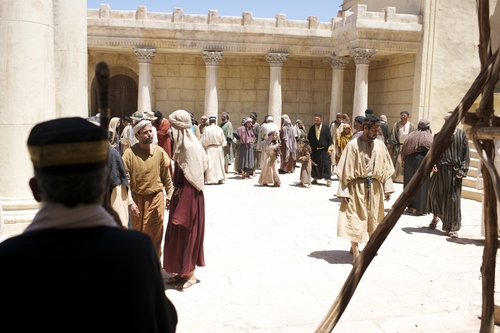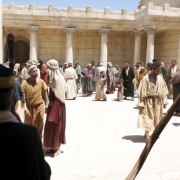Besser als ein Zeugnis
Da sich aber der geheilte Lahme zu Petrus und Johannes hielt, lief alles Volk voll Erstaunen bei ihnen zusammen in der sogenannten Halle Salomos. Als Petrus das sah, wandte er sich an das Volk: Ihr Männer von Israel, weshalb verwundert ihr euch darüber, oder weshalb blickt ihr auf uns, als hätten wir durch eigene Kraft oder Frömmigkeit bewirkt, daß dieser umhergeht? (Apostelgeschichte 3,11-12)
Ein Mann war auf spektakuläre Weise am belebtesten Platz Jerusalems geheilt worden, und es versammelte sich rasch eine Menschenmenge dort. Der geheilte Lahme hielt sich zu Petrus und Johannes – aber nicht, weil er nicht stehen konnte. Denn er war geheilt! Vielleicht blieb er aus Dankbarkeit bei ihnen, oder aus Furcht oder Überraschung. Als das Volk bei ihnen zusammen lief, waren sie voll Erstaunen, und der vorher gelähmte Mann wusste nicht, was nun passieren würde.

Doch Petrus wusste es. Als Petrus das sah, wandte er sich an das Volk. Petrus nutzte diese Gelegenheit, dass so viele Menschen dort waren. Denn er wusste, dass das Wunder an sich niemanden zu Jesus führen würde, es hatte nur ihr Interesse geweckt. Auch wenn sie voll Erstaunen waren, glaubten sie noch nicht an Jesus.
Das wäre vielleicht eine gute Zeit für einen Heilungsgottesdienst gewesen. Da schon der Gelähmte geheilt worden war, hätte Petrus nun sagen können: „Wer möchte noch von Jesus geheilt werden?“ Doch das tat Petrus nicht.
Es wäre vielleicht auch eine gute Zeit für das Hören von Zeugnissen gewesen, denn der Gelähmte hatte eine großartige Erfahrung gemacht. Zeugnisse sind wunderbar, doch selbst ein tolles Zeugnis ist an sich nicht das Evangelium, die gute Nachricht von der Errettung durch Jesus Christus. Die gute Nachricht ist Gottes Botschaft davon, wer Jesus ist, und was Er tat um uns zu retten, insbesondere das, was Er am Kreuz tat und das leere Grab. Ein Zeugnis ist die Geschichte vom Werk des Evangeliums, nicht das Evangelium selbst. Petrus leitete hier keinen Zeugnisgottesdienst.
Petrus wusste, dass die Menge das Evangelium von Jesus Christus und einen Aufruf zur Buße und zum Glauben hören musste. Da der geheilte Mann noch nicht genug über das Evangelium wusste, übernahm Petrus das Reden.
Petrus sagt, dass die Heilung nicht durch seine eigene Kraft oder Frömmigkeit geschah. Viele Evangelisten oder Prediger heutzutage würden niemals behaupten, dass sie durch ihre Kraft heilen, und doch vermitteln sie den Eindruck, dass Heilung geschieht, weil sie so fromm sind, so nah bei Gott oder so gottgefällig. Petrus wusste, dass es nur von Jesus kam und nicht von ihm.
Petrus wusste, dass rettender Glaube nicht durch das Hören oder Sehen von Wundern kommt, sondern der Glaube kommt aus der Verkündigung, die Verkündigung aber durch Gottes Wort (Römer 10,17). Dein Zeugnis ist großartig – preise Gott dafür. Gottes machtvolle Werke sind wundervoll, und wir feiern diese. Doch Wort Gottes und die gute Nachricht von Jesus Christus muss der Kern dieser Botschaft für eine verlorene und bedürftige Welt sein.





